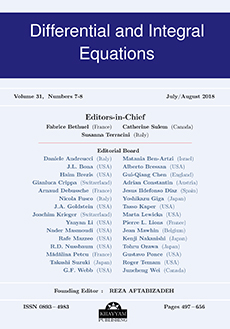Abstract
Let $\sigma$ denote the Hilbert transform and $\mu\geq0$. We prove that if $u\in C\left( \left[ 0,T\right] ,H^{2}\left( \mathbb{R}\right) \cap L_{2}^{2}\left( \mathbb{R}\right) \right) $ is a solution of \[ \partial_{t}u+2\sigma\partial_{x}^{2}u+u\partial_{x}u=\mu\partial_{x}^{2}u \] such that there are $t_{0} <t_{1}$ $ <t_{2\text{ }}$satisfying $u\left( t_{j}\right) \in H^{4}\left( \mathbb{R}\right) \cap L_{4}^{2}\left( \mathbb{R}\right) $, $j=0,1,2$, then $u\left( t\right) =0$ for all $t\in\left[ 0,T\right] $.
Citation
Rafael José Iorio Jr.. "Unique continuation principles for the Benjamin-Ono equation." Differential Integral Equations 16 (11) 1281 - 1291, 2003. https://doi.org/10.57262/die/1356060510
Information





